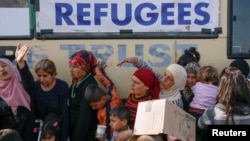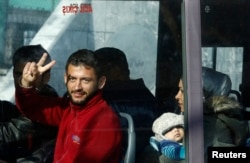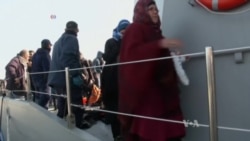As Turkey prepared to receive a second group of migrants deported from Greece this week, European Union officials on Wednesday pledged there would be “no automatic return” for the migrants before they are given a chance to apply for asylum.
The announcement follows angry protests by international human rights activists who have accused the EU of denying migrants the basic rights of refugees to seek asylum as the deportations began from the Greek islands of Lesbos and Chios Monday.
“There will be individual assessments. There will be no automatic return. Everybody will be given the right to ask for asylum,” Jean-Pierre Schembri, spokesman for the European Asylum Support Office, told VOA from Lesbos.
Schembri was among nearly 70 EASO staff arriving on the island Wednesday to begin handling asylum claim procedures following a wave of protests against the deportations, which are happening under the terms of a March agreement between the EU and Turkey to address Europe's migrant crisis.
Among those protesting on Lesbos was Kavita Kapur, a lawyer from California who has been in contact with those deported earlier this week.
“The biggest problem is the people who were going to be returned to Turkey had no idea they were going to be returned to Turkey up until maybe a few hours before it happened,” she told VOA.
“They were supposed to be given the right to seek asylum. They were given ‘Know Your Rights’ sheets in English. They were not provided with interpreters. Most of them who indicated to us volunteers that they wanted to seek asylum were not actually given access to that process,” she said.
Addressing concerns
EU officials are working to ease those concerns and address accusations the process has not been transparent, fair, or humane.
Schembri said EU asylum officers would take the individual applicants’ vulnerabilities into consideration. This would be key to addressing activists’ concerns about sending the deportees to Turkey, a country with a spotty human rights record. Those deemed ineligible for asylum will have five days to appeal the decision.
Slower process
The new procedures for handling asylum cases could further slow the process of clearing an estimated 3,000 migrants now housed at Moria, the largest, overcrowded migrant detention center on Lesbos.
EU officials say about 1,000 migrants have expressed interest in applying for asylum. Starting Thursday, officials will only be able to process up to 50 cases a day. Greek officials say between 300 and 500 migrants continue to arrive from Turkey daily.
WATCH: Migrants Fear Deportation to Turkey
















